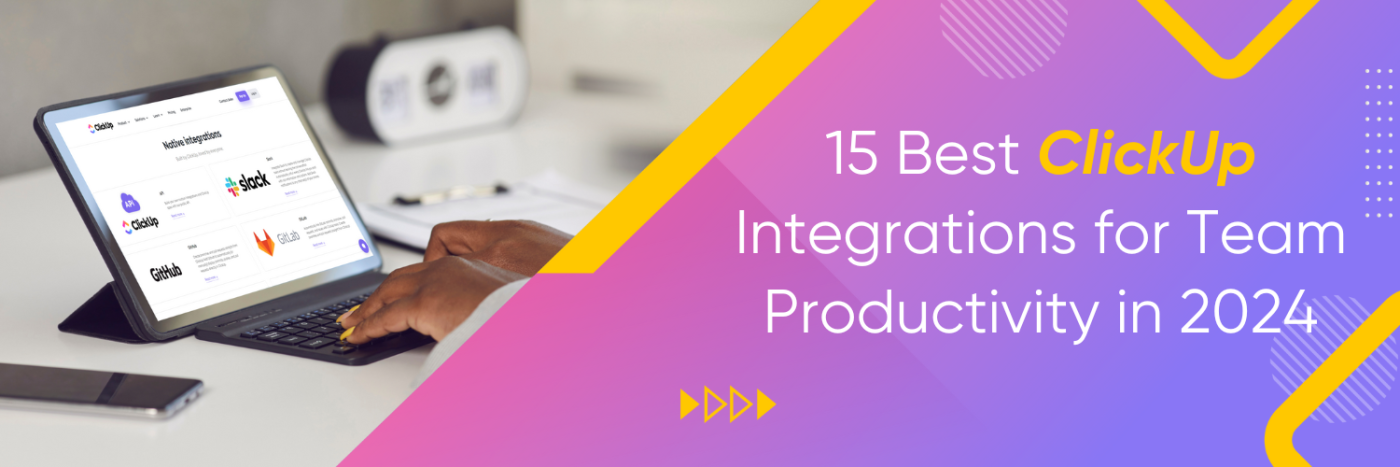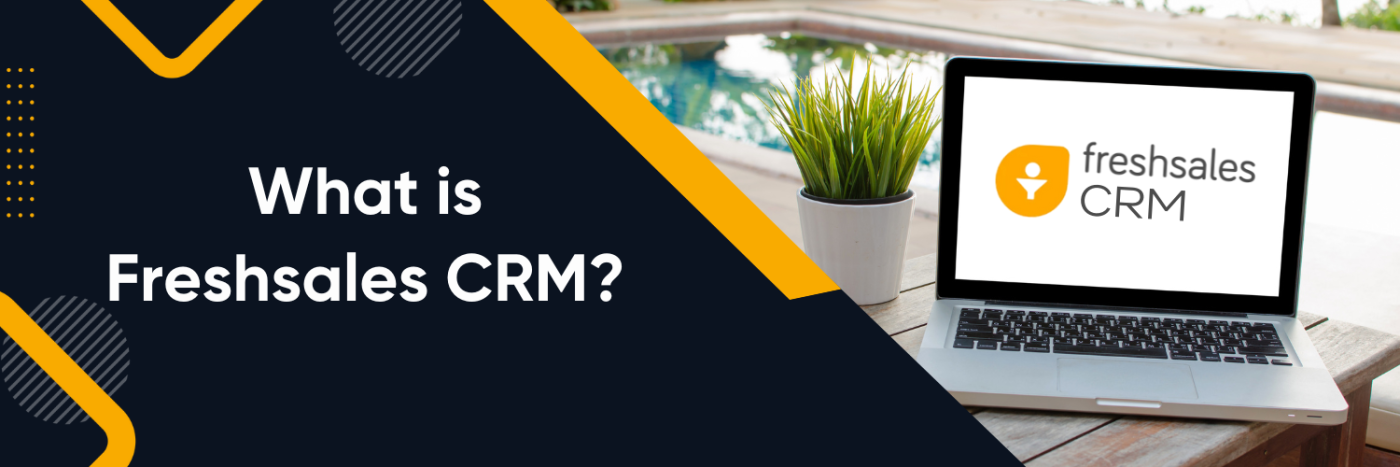What is Lead Generation?
Lead generation is about turning your potential customers into actual ones. It helps businesses grab those leads, take care of them, and turn them into loyal customers. To stay ahead in the game and make the most of your lead generation efforts, it’s crucial to keep up with the latest tools and tech.
Types of Leads in Sales

Marketing Qualified Lead (MQL)
Marketing Qualified Leads are individuals who have engaged with a company’s marketing efforts but haven’t yet been qualified for direct sales contact. Typically, these leads have shown interest by actions such as downloading a whitepaper, subscribing to a newsletter, or attending a webinar, but have not yet indicated a clear buying intent.
Sales Qualified Lead (SQL)
Sales Qualified Leads are a step ahead of MQLs in the sales funnel. They have undergone an additional vetting process by the sales team to determine their interest and readiness to buy. SQLs are usually ready for a more direct sales pitch.
Product Qualified Lead (PQL)
Product Qualified Leads are individuals who have used a product or service and have shown interest in becoming a paying customer. This is common in businesses that offer free trials or freemium products. PQLs have experienced the value of the product firsthand, making them more likely to convert.
Service Qualified Lead
Service Qualified Leads are customers who have indicated to customer service that they are interested in upgrading their product or service. These leads are often forwarded directly to the sales team since they have a high likelihood of converting into a sale.
Information Qualified Lead (IQL)
Information Qualified Leads are at the very top of the sales funnel. They are individuals who have provided their contact information in exchange for some form of content or information, such as an e-book or a guide. While IQLs are still leads, they require significant nurturing before they can be considered as potential customers.
Warm Lead
Warm leads are individuals who have shown some level of interest in a product or service. They might have been referred by a current customer or have inquired about your product or service. They have a basic familiarity with your company but are not yet ready to make a purchase.
Cold Lead
Cold leads have not shown any interest or interaction with your business or products. They might be part of a purchased contact list or a broad demographic that a company is targeting. Cold leads require a lot of effort to nurture and educate before they can become warm leads.
Hot Lead
Hot leads are at the bottom of the sales funnel and are ready to make a purchase. They have shown clear buying signals, such as requesting a product demo or asking about pricing. Sales teams prioritize hot leads as they require immediate attention and have a high likelihood of conversion.
Understanding these types of leads is crucial for sales teams to effectively prioritize and customize their outreach and sales strategies. By focusing on leads based on their readiness and interest, sales teams can optimize their efforts and improve conversion rates.
Types of Lead Generation Software Tools

a. Customer Relationship Management (CRM) Tools
CRM tools are central to managing customer data, tracking interactions, and streamlining lead nurturing processes. These tools enable businesses to organize and analyze customer information, identify sales opportunities, and track customer engagement. Popular CRM software options such as Salesforce, HubSpot CRM, and Zoho CRM offer features like contact management, deal tracking, task automation, and reporting capabilities.

b. Email Marketing Software
Email marketing software plays a crucial role in designing, sending, and tracking email campaigns for lead generation. These tools offer features like email automation, personalized email templates, A/B testing, and advanced analytics to measure campaign performance. Leading email marketing software tools such as Mailchimp, Constant Contact, and Sendinblue provide intuitive interfaces, robust email builders, and integration capabilities with other marketing platforms.
c. Landing Page Builders

Landing page builders are essential for creating visually appealing and high-converting landing pages that capture leads effectively. These tools offer drag-and-drop functionality, pre-designed templates, and customization options to design landing pages without coding knowledge. Additionally, A/B testing capabilities allow businesses to optimize landing page performance. Prominent landing page builders tools like Unbounce, Instapage, and Leadpages provide easy-to-use interfaces, responsive designs, and integrations with popular marketing tools.
d. Marketing Automation Software

Marketing automation software enables businesses to automate repetitive marketing tasks, segment leads based on behavior and demographics, and personalize communication at scale. These tools streamline lead nurturing processes, helping companies to deliver targeted content and timely follow-ups to move leads through the sales funnel. Leading marketing automation software tools like Marketo, Pardot, and ActiveCampaign offer features such as lead scoring, automated workflows, campaign tracking, and integrations with CRM systems.
How to Choose Lead Generation Software & Tools?

a. Budget and Pricing
When selecting lead generation software tools, it is crucial to consider the cost and pricing structure. Evaluate different subscription plans, scalability options, and any additional costs for advanced features or integrations. Take into account your budgetary constraints and the potential return on investment that the software can provide.
b. Features and Functionality
Consider the key features and functionality offered by lead generation software tools. Look for features such as lead capture forms, lead scoring, analytics and reporting, A/B testing, email automation, and integrations with other marketing platforms. Assess your specific business requirements and goals to determine which features are essential for your lead-generation efforts.
c. User Interface and Ease of Use
The user interface and ease of use of lead generation software tools are crucial factors in maximizing productivity and reducing learning curves. Consider the user experience and the intuitiveness of the software’s workflows. Look for tools that offer user-friendly interfaces, clear navigation, and comprehensive documentation or support resources.

d. Integrations and Compatibility
Evaluate the integrations and compatibility of lead generation software tools with your existing technology stack. Ensure that the software can seamlessly integrate with other essential platforms such as CRM systems, email marketing tools, analytics software, and content management systems. Compatibility and integration capabilities play a vital role in streamlining your lead generation processes and data management.
Top 10 Lead Generation Software & Tools
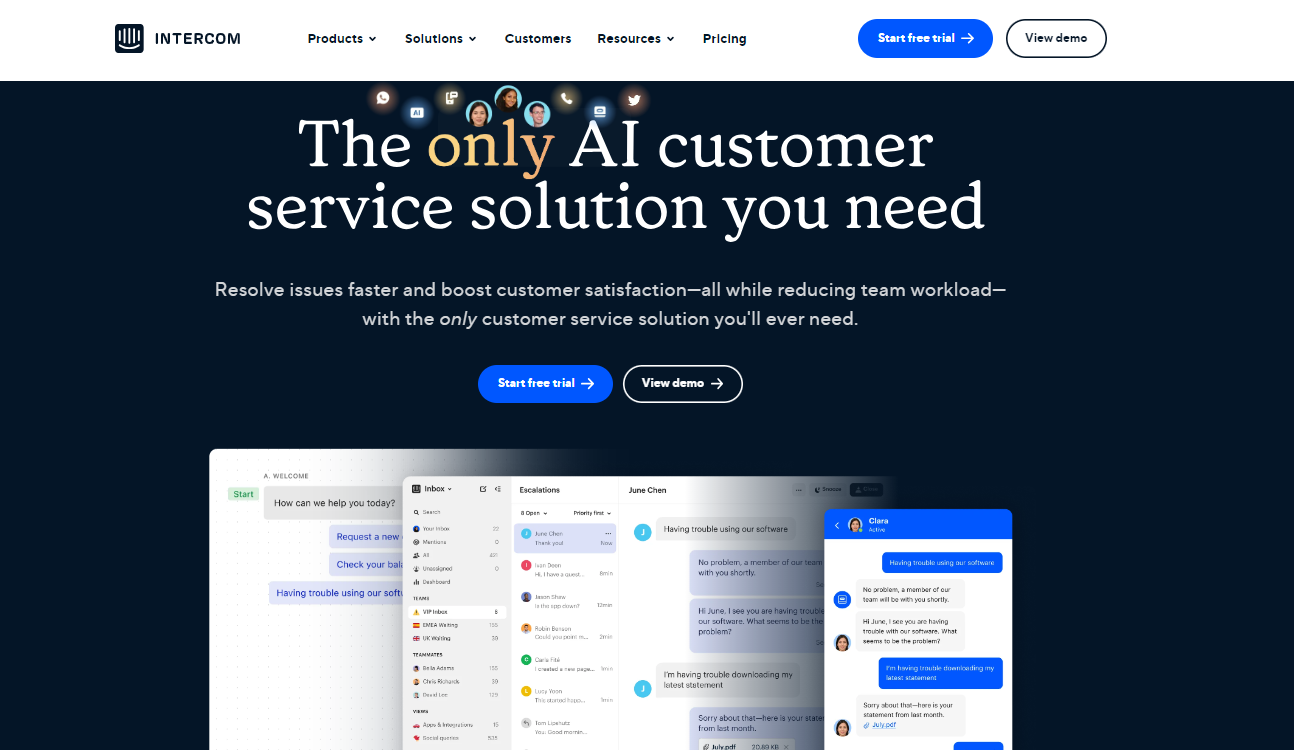
1. Intercom
Intercom is a conversational relationship platform that helps businesses communicate with potential customers in real time. Through chatbots and personalized messaging, Intercom engages visitors to your website. Its lead generation features allow you to capture visitor information through chats and then funnel these leads into marketing or sales pipelines. This platform is particularly effective for businesses looking to provide an engaging experience for website visitors.
- Pricing: Pricing starts at $59/month for their Basic plan and increases depending on features and usage.
- Ease of Use: Intercom is known for its simple and intuitive interface.
- Integrations: It integrates with platforms like Salesforce, Marketo, HubSpot, Slack, etc.
2. Outreach
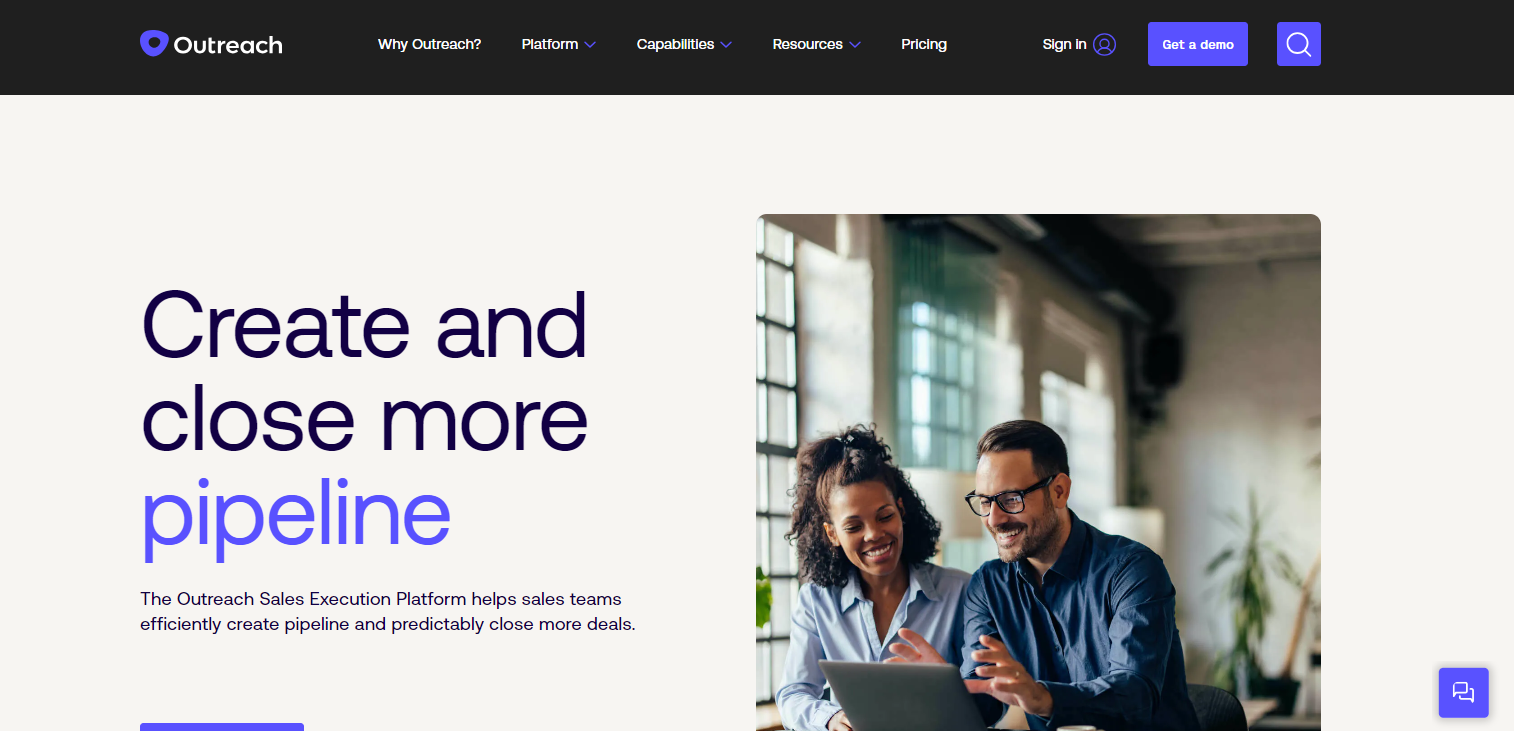
Outreach is a sales engagement platform designed to boost the productivity of sales teams. It helps automate and streamline communication with prospects, thus helping generate more leads. Through Outreach, you can create sequences of automated emails, calls, and social touches to engage potential leads. It also offers analytics to track which messages and sequences are most effective. Furthermore, Outreach has integration capabilities with various CRMs, ensuring the data is consistent across platforms.
- Pricing: Outreach does not publicly disclose their pricing, and you must contact them for a custom quote.
- Ease of Use: Outreach has a learning curve, but it’s highly customizable and offers solid customer support.
- Integrations: It integrates with various CRM systems like Salesforce, as well as email platforms and sales intelligence tools.
3. Salesforce
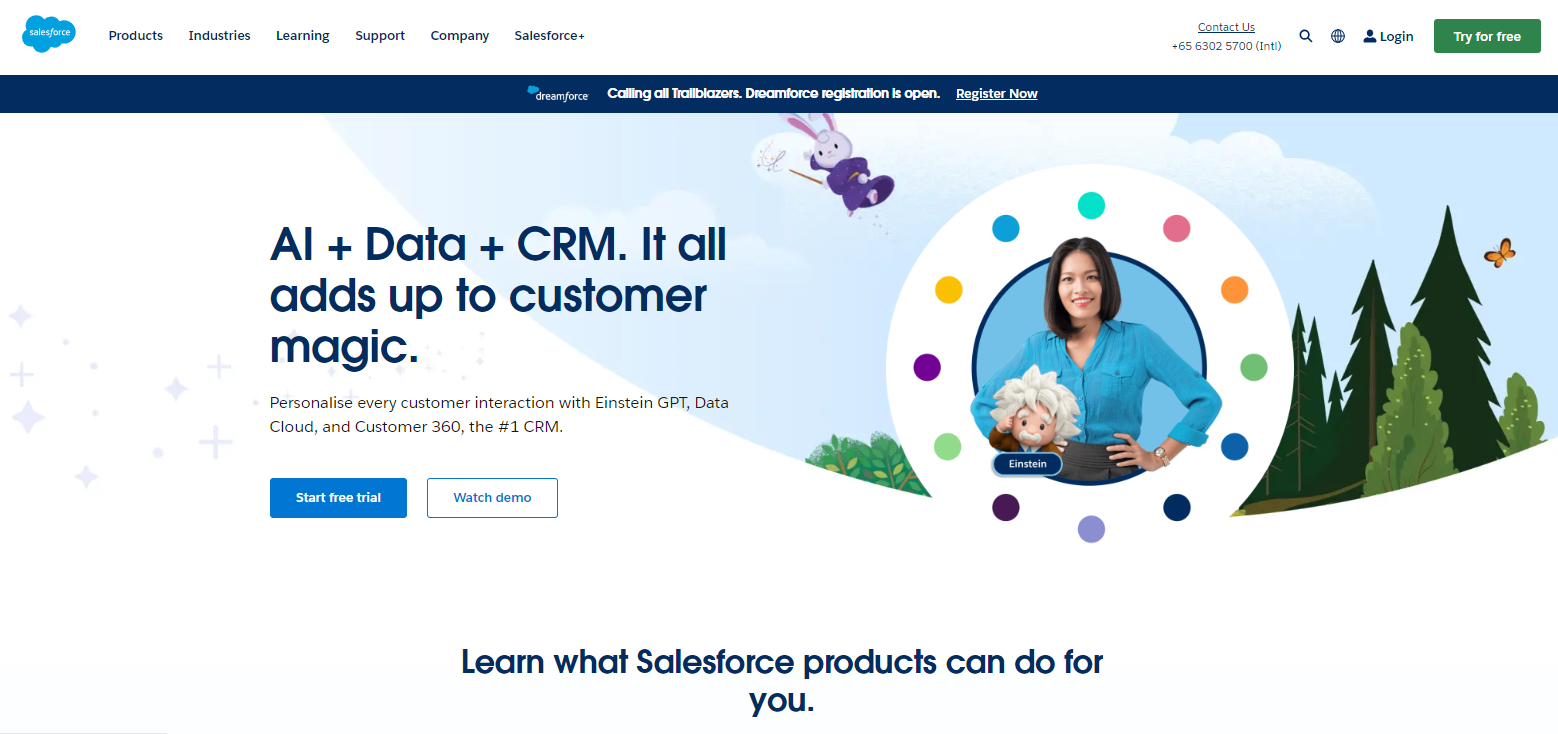
Salesforce is primarily CRM software but has extensive features that aid in lead generation. With Salesforce, you can track all the information about your leads and their activities in one place. Its Web-to-Lead feature allows you to capture lead data from website forms directly into your CRM. Lead scoring and routing help sales teams prioritize and assign leads effectively. Automated marketing features like email campaigns and event management are useful in nurturing leads down the sales funnel.
- Pricing: Salesforce’s pricing ranges from $25/user/month for the Essentials plan to $300/user/month for the Unlimited plan.
- Ease of Use: Salesforce is powerful but can be complex for new users. It may require some training.
- Integrations: Salesforce has a huge ecosystem and integrates with countless apps through its AppExchange marketplace.
4. Marketo
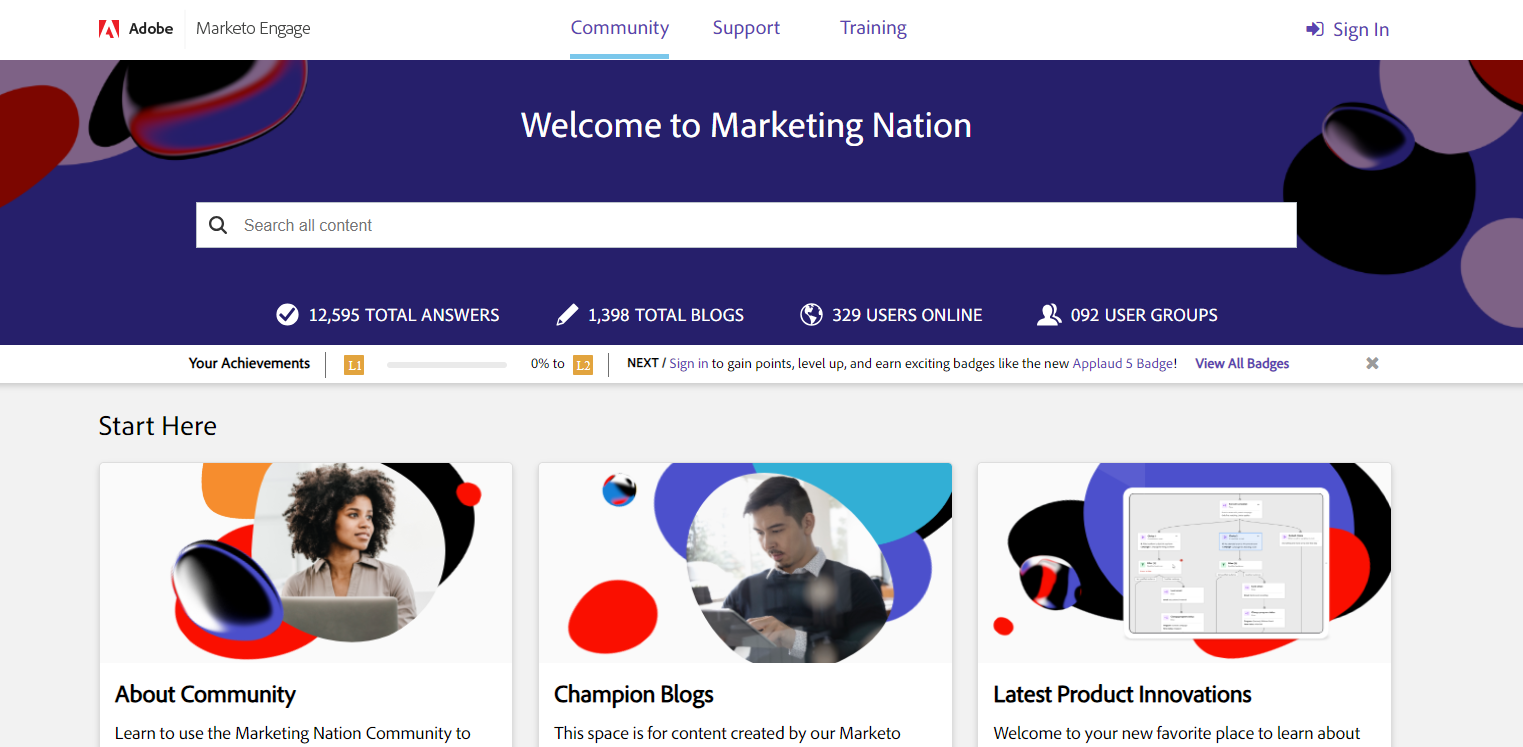
Marketo, part of Adobe Experience Cloud, is a robust marketing automation platform. It excels in lead management by offering features such as email marketing, leads nurturing, and lead scoring. Marketo’s comprehensive analytics help in understanding how marketing campaigns are performing and which leads are most likely to convert. Its ability to personalize content based on user behavior and preferences makes it a potent tool for attracting and engaging leads.
- Pricing: Marketo’s pricing is not publicly available, and you need to contact them for a quote.
- Ease of Use: Marketo can be complex but offers extensive documentation and a community forum.
- Integrations: Marketo integrates with CRM systems, social media platforms, and other marketing tools.
5. Leadfeeder
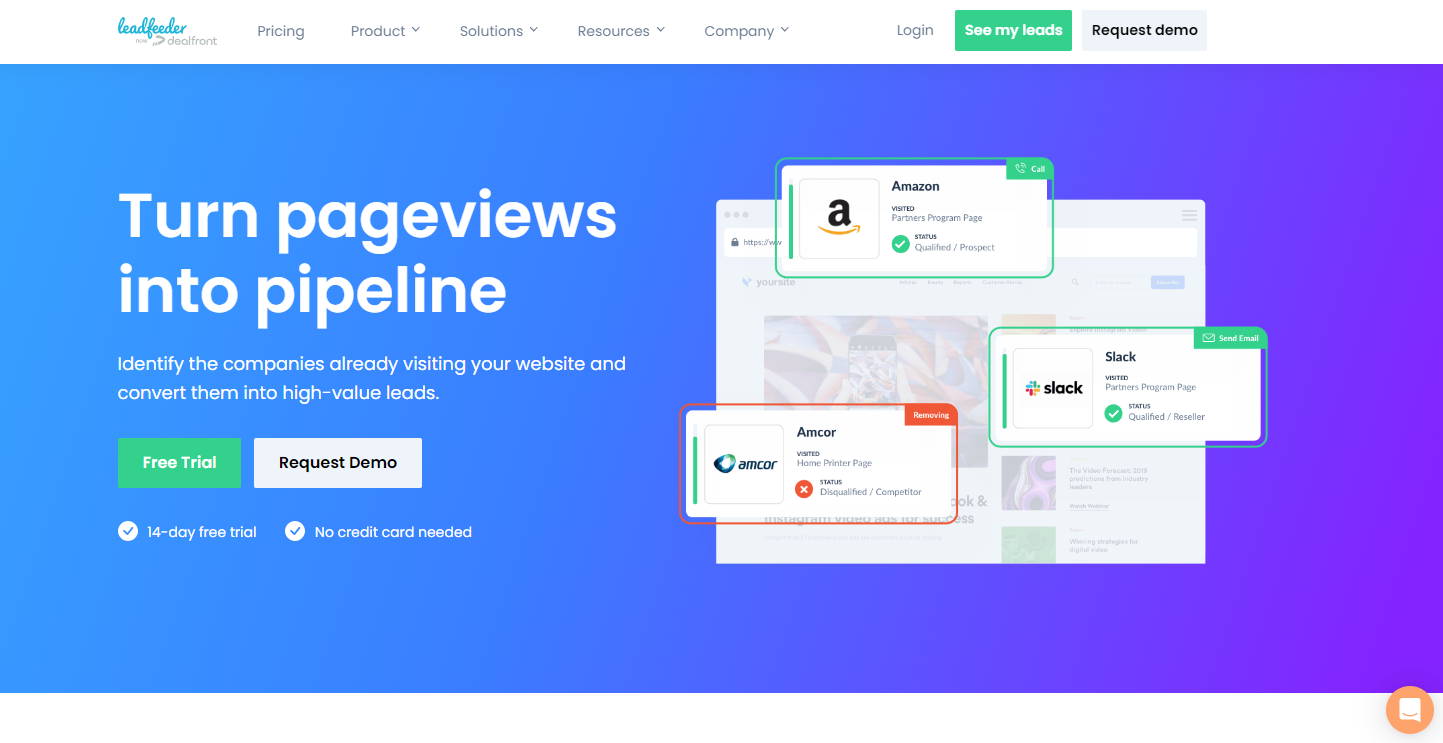
Leadfeeder is a lead generation software that specializes in tracking website visitors. It integrates with Google Analytics to identify companies that are visiting your site, providing insights into what they are interested in. You can then use this information to reach out to potential leads. Leadfeeder also offers CRM integration, so the lead data can be directly input into your sales pipeline.
- Pricing: Leadfeeder offers a free version with limited features. Their paid version starts from $79/month, billed annually.
- Ease of Use: Leadfeeder is user-friendly and straightforward to set up.
- Integrations: It integrates with CRMs like Pipedrive, and Salesforce, and also with email marketing tools like Mailchimp.
6. DiscoverOrg
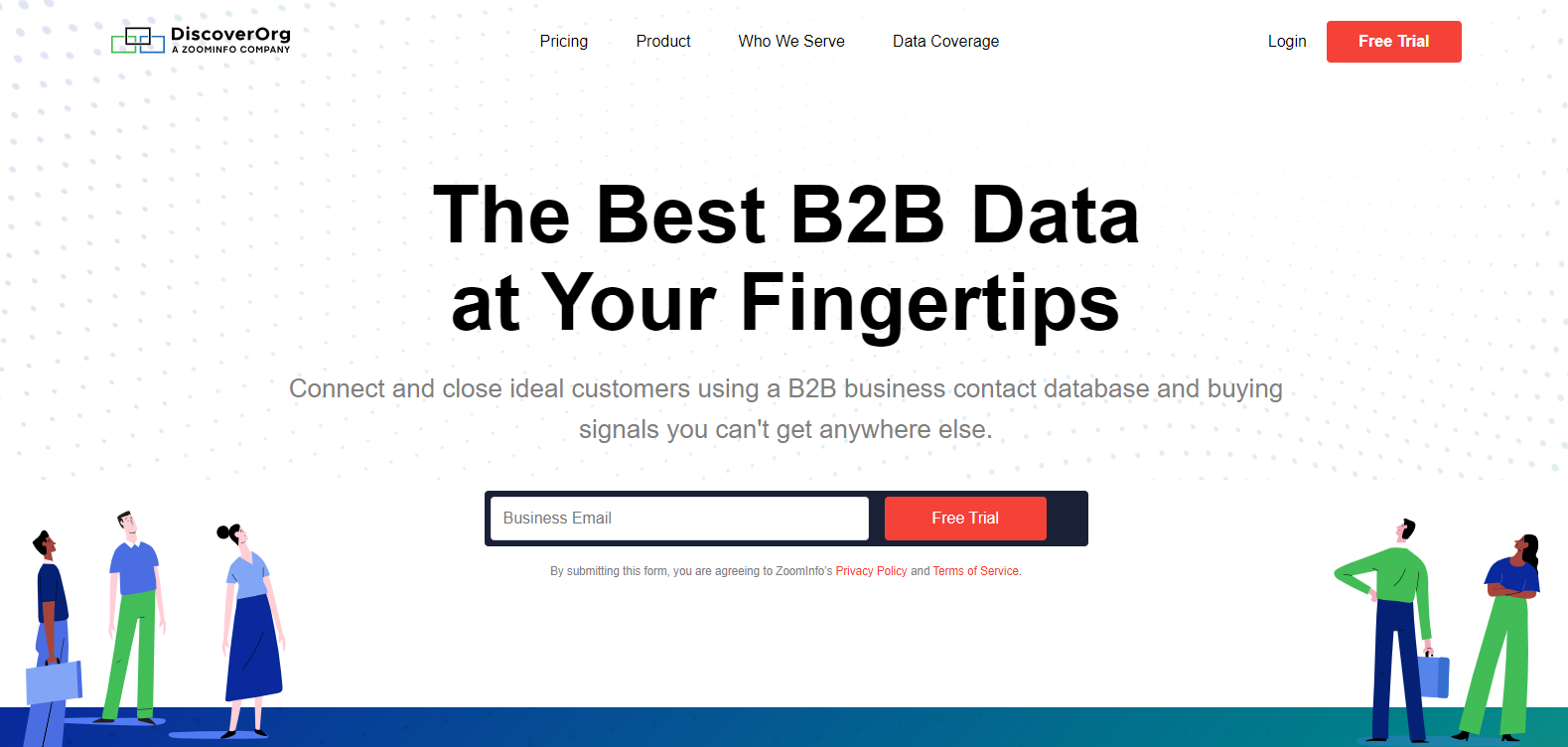
DiscoverOrg specializes in providing highly accurate business intelligence. It’s primarily a contact database that helps sales, marketing, and HR professionals to identify and connect with decision-makers in their target industry. Through high-quality data on your prospects, DiscoverOrg helps in creating more targeted and effective outreach campaigns for lead generation.
- Pricing: Pricing information is custom and provided upon request to DiscoverOrg.
- Ease of Use: DiscoverOrg has a well-designed interface, but some users might find a learning curve in harnessing the full potential of the database.
- Integrations: It integrates with CRMs like Salesforce, Marketo, and other sales engagement platforms.
7. HubSpot
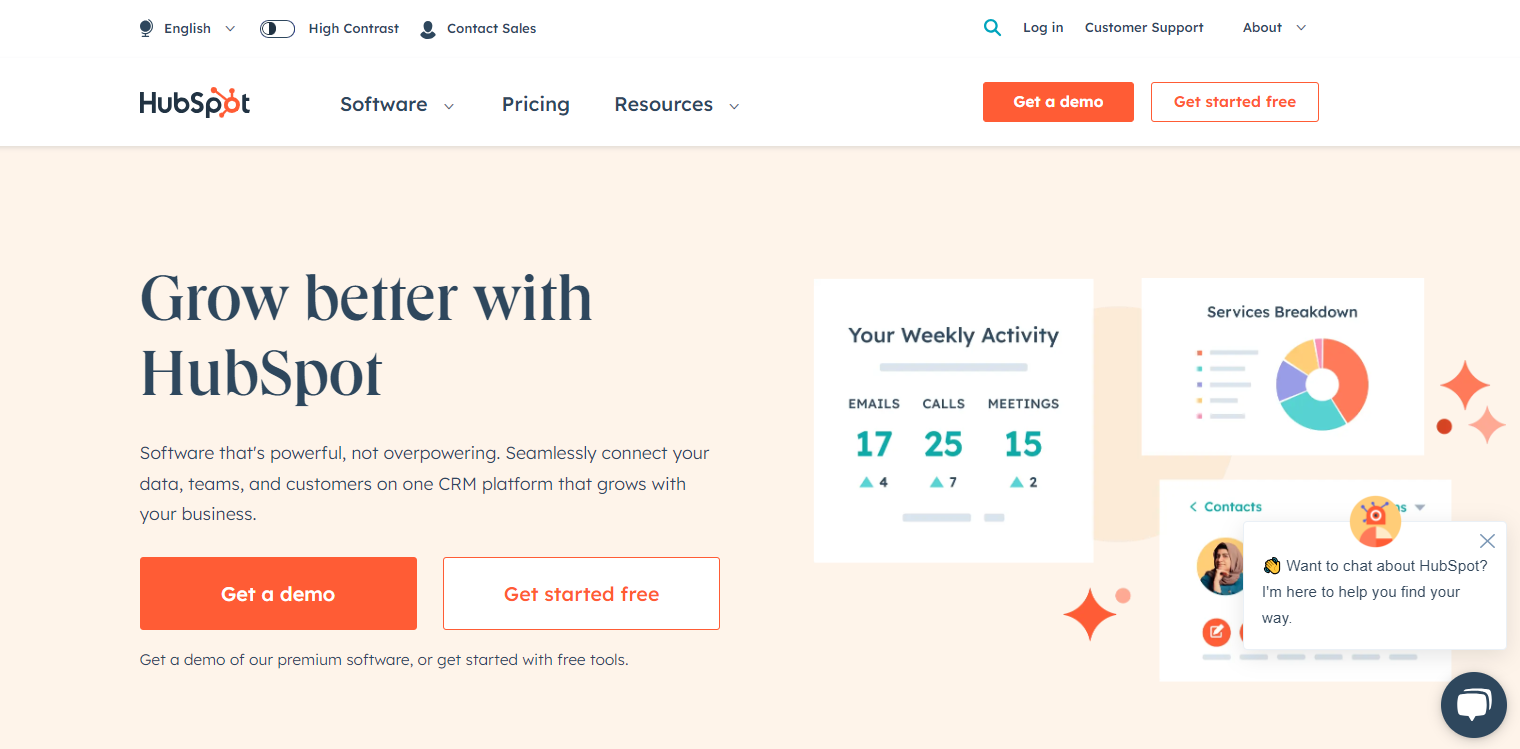
HubSpot is widely regarded as a comprehensive tool for inbound marketing, sales, and customer service. Its lead generation capabilities are extensive. With HubSpot, you can create and optimize content to attract leads via blogging, SEO tools, and social media integration. It also offers landing pages, calls to action, and forms that are essential in capturing leads. What’s more, HubSpot’s CRM automatically organizes and tracks leads in a tidy timeline. Its email marketing feature allows you to segment leads and personalize outreach, while the analytics tools help you measure how your campaigns are performing.
- Pricing: HubSpot offers a free plan with basic features. For more advanced features, their paid plans range from $50 per month for the Starter plan to custom pricing for the Enterprise-level plan.
- Ease of Use: HubSpot is known for its user-friendly interface and provides extensive documentation and tutorials for new users.
- Integrations: HubSpot integrates with a wide range of applications including Salesforce, Shopify, Google Apps, and many others.
8. LinkedIn Sales Navigator
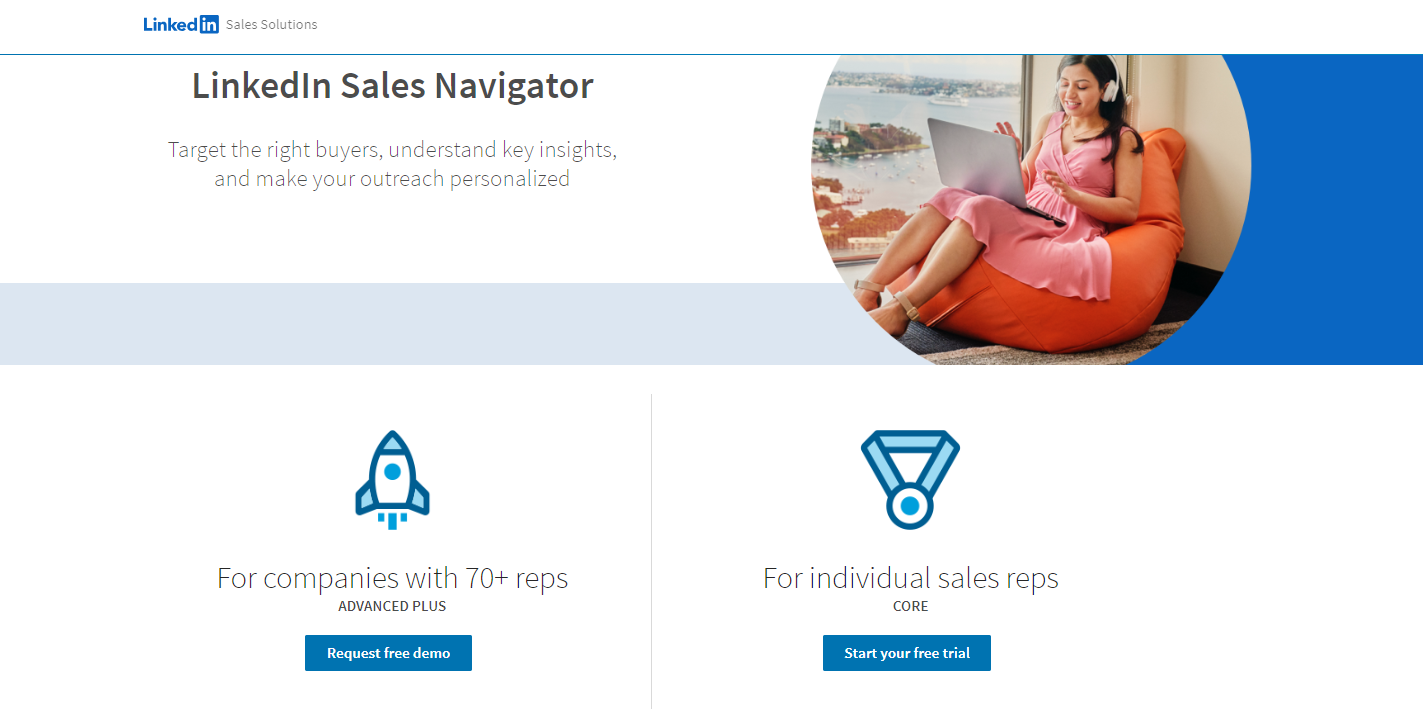
LinkedIn Sales Navigator is specifically built for social selling and is an ideal tool for B2B lead generation. Leveraging the LinkedIn network, it allows users to find and connect with prospects more effectively. Features include advanced search filters, lead recommendations, and InMail credits. Furthermore, it provides real-time insights about your leads, helping you engage them more effectively.
- Pricing: Prices start at around $64.99/month for the Professional Plan, with Team and Enterprise options available.
- Ease of Use: It’s fairly intuitive, especially for those familiar with LinkedIn.
- Integrations: It integrates with CRM systems like Salesforce and Microsoft Dynamics.
9. Unbounce
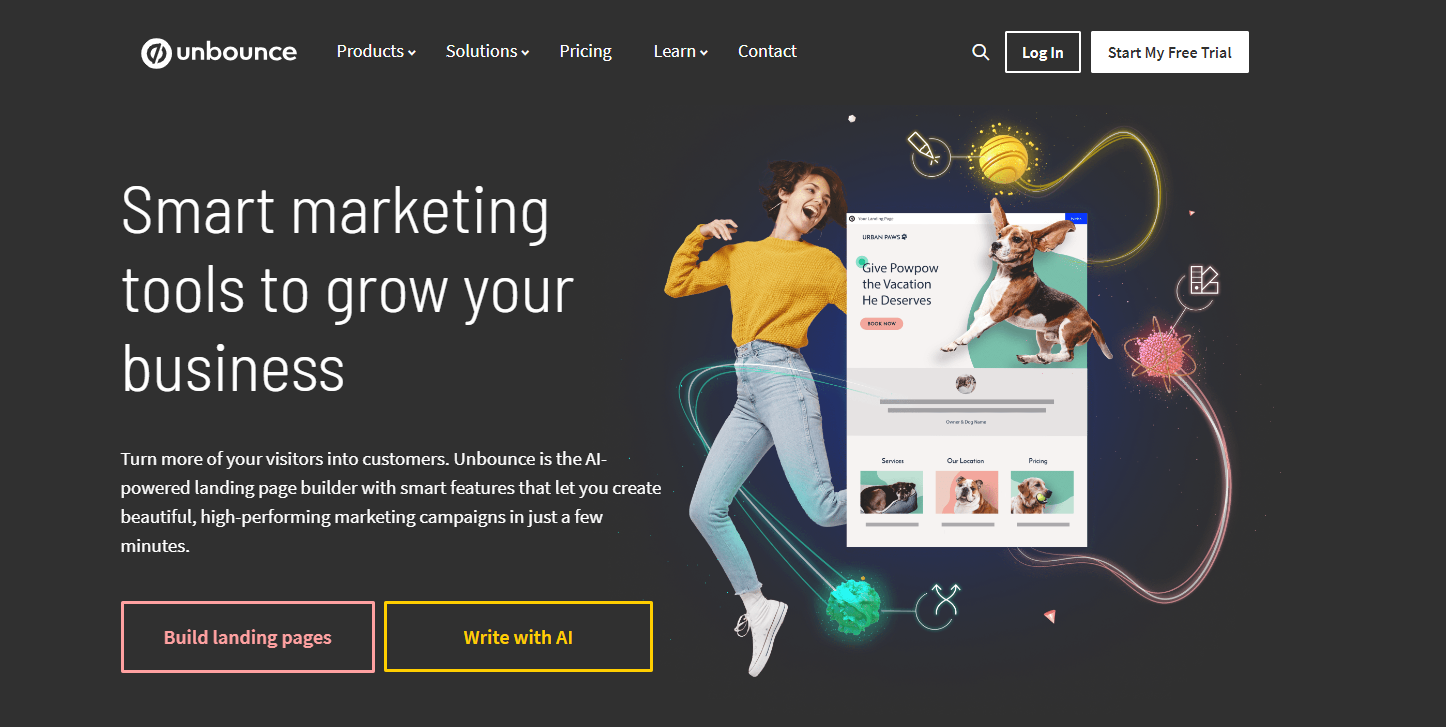
Unbounce specializes in creating landing pages that convert. With its drag-and-drop builder, you can design and publish attractive landing pages without the need for coding. Unbounce’s A/B testing allows you to optimize pages for conversions. Popups and sticky bars further help in capturing lead information. This tool is particularly useful for campaigns where you need to direct traffic to a dedicated page to capture lead information.
- Pricing: Unbounce pricing starts at $80/month for the Launch plan, $120/month for the Optimize plan, and $300/month for the Accelerate plan. There’s also an Enterprise plan with custom pricing.
- Ease of Use: Unbounce’s drag-and-drop feature makes it very user-friendly, even for non-tech-savvy users.
- Integrations: Unbounce integrates with a variety of tools like CRM, email, and analytics tools.
10. OptinMonster
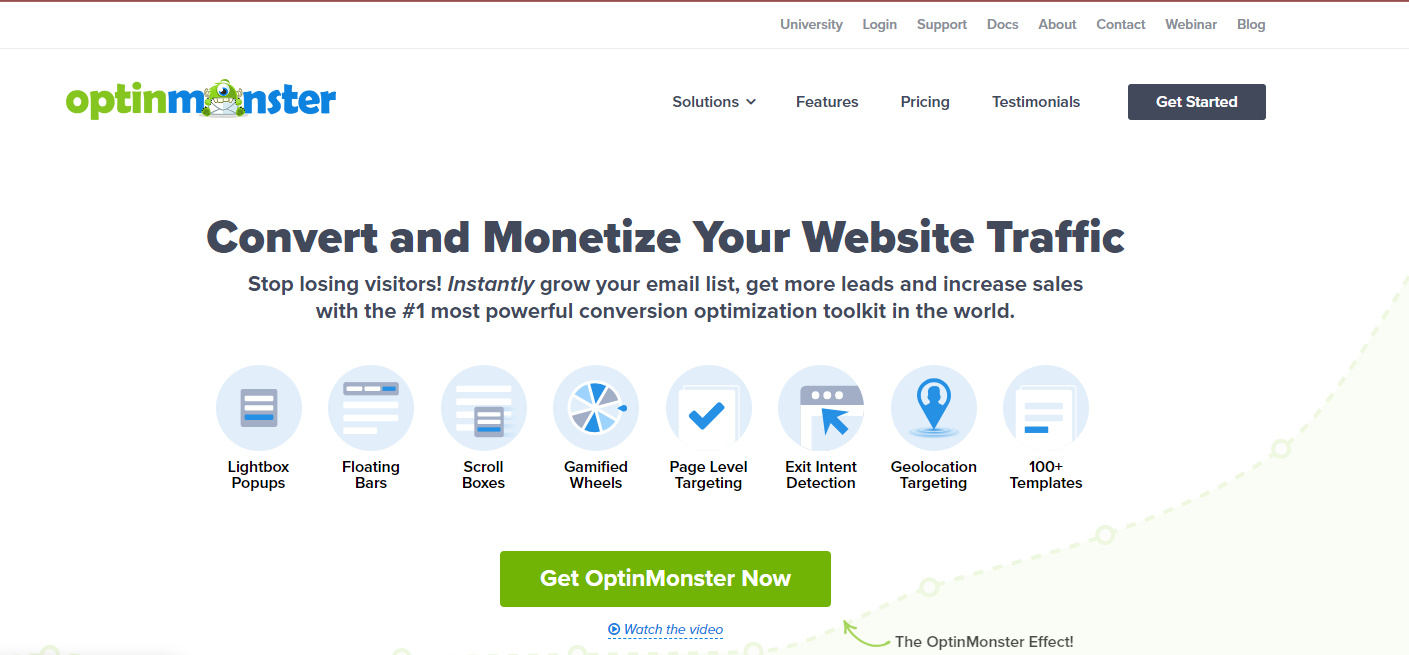
OptinMonster is popular for its ability to create eye-catching pop-ups to capture lead information. With its drag-and-drop builder, you can easily create opt-in forms that are optimized for conversions. OptinMonster also offers targeting and segmentation, A/B testing, and analytics to help you make data-driven decisions. Integrations with email marketing services make it seamless to nurture the leads you capture.
- Pricing: OptinMonster’s plans start at $9/month for the Basic plan, $19/month for the Plus plan, $29/month for the Pro plan, and $49/month for the Growth plan.
- Ease of Use: OptinMonster is known for its ease of use and intuitive form builder.
- Integrations: It integrates with email marketing services, content management systems, and eCommerce platforms.
11. Zendesk Sell

Zendesk Sell is a CRM platform designed to streamline sales processes and improve customer relationships. It offers features such as contact management, deal tracking, and sales reporting to help sales teams stay organized and efficient. With its intuitive interface and customizable workflows, Zendesk Sell empowers sales reps to prioritize leads, engage prospects, and close deals effectively.
- Pricing: Zendesk Sell offers plans starting from $19 per user per month, with additional features available in higher-tier plans.
- Ease of Use: Known for its user-friendly interface and straightforward setup process.
- Integrations: Integrates with popular tools like Gmail, Microsoft Outlook, Mailchimp, and Slack for seamless workflow management.
12. Pipedrive

Pipedrive is a sales CRM built for small to medium-sized businesses. It provides visual pipelines that allow users to track deals through various stages of the sales process. Pipedrive offers customizable fields, activity reminders, and sales forecasting tools to help sales teams stay focused and productive. Its mobile app ensures that sales reps can access important information and update deals on the go.
- Pricing: Pipedrive’s plans start at $12 per user per month, with advanced features available in higher-tier plans.
- Ease of Use: Pipedrive is praised for its simplicity and ease of navigation, making it a favorite among sales professionals.
- Integrations: Integrates with over 150 third-party apps, including Google Workspace, Zapier, Slack, and Trello, for enhanced productivity.
13. Agile CRM

Agile CRM is a comprehensive CRM platform that combines sales, marketing, and customer service automation. It offers features such as contact management, email tracking, telephony, and project management in one integrated solution. Agile CRM’s goal is to help businesses build stronger customer relationships and drive sales growth through personalized communication and automation.
- Pricing: Agile CRM offers a free plan for up to 10 users, with paid plans starting at $8.99 per user per month.
- Ease of Use: Agile CRM provides a user-friendly interface and customizable dashboards to suit individual preferences and workflows.
Integrations: Integrates with popular tools like - Gmail, Outlook, Slack, and WordPress, as well as marketing automation platforms like Mailchimp and HubSpot.
14. AeroLeads

AeroLeads is a lead generation tool that helps businesses find and capture prospects’ contact information. It enables users to search for leads based on various criteria, such as job title, industry, and location, and extract contact details like email addresses and phone numbers. AeroLeads also integrates with CRM systems to streamline lead management and nurturing processes.
- Pricing: AeroLeads offers plans starting at $19 per month, with custom enterprise solutions available for larger organizations.
- Ease of Use: AeroLeads provides a simple and intuitive interface, making it easy for users to search for and export leads with minimal effort.
Integrations: Integrates with CRMs like Salesforce, - HubSpot, and Pipedrive, as well as popular email marketing tools and social media platforms.
15. Hunter.io

Hunter.io is an email finder and verifier tool that helps businesses find and verify email addresses associated with specific domains. It allows users to search for email addresses by entering a domain name or company name, providing a list of verified email addresses along with their sources. Hunter.io also offers email verification services to ensure the accuracy of email lists and improve deliverability rates.
- Pricing: Hunter.io offers a free plan with limited features, as well as paid plans starting at $34 per month for higher usage volumes and additional features.
- Ease of Use: Hunter.io provides a user-friendly interface and browser extensions for convenient access to its features while browsing the web.
- Integrations: Integrates with popular CRM systems, email marketing platforms, and Google Sheets for seamless workflow integration.
16. Sprout Social

Sprout Social is a social media management platform that helps businesses manage their social media presence across multiple channels. It offers features such as social media scheduling, publishing, monitoring, and analytics to help users engage with their audience and track the performance of their social media campaigns. Sprout Social also provides collaboration tools for teams to work together on social media content and responses.
- Pricing: Sprout Social offers plans starting at $199 per user per month, with additional features available in higher-tier plans.
- Ease of Use: Sprout Social provides an intuitive interface and customizable dashboards to meet the needs of different users and organizations.
- Integrations: Integrates with popular social media platforms like Facebook, Twitter, Instagram, and LinkedIn, as well as CRM systems and helpdesk software for seamless data sharing.
17. Hootsuite

Hootsuite is a social media management platform that allows users to schedule, publish, and analyze social media content from a single dashboard. It supports multiple social networks, including Facebook, Twitter, Instagram, LinkedIn, and YouTube, making it easy for users to manage all their social media accounts in one place. Hootsuite also offers features such as social listening, team collaboration, and content curation to help businesses maximize their social media presence.
- Pricing: Hootsuite offers plans starting at $99 per month for individuals and small businesses, with custom pricing available for larger enterprises.
- Ease of Use: Hootsuite provides a user-friendly interface and a wide range of tutorials and resources to help users get started quickly.
- Integrations: Integrates with over 250 apps and services, including CRM systems, analytics tools, and content management platforms, for enhanced functionality and workflow automation.
18. CallPage

CallPage is a sales acceleration platform that helps businesses convert website visitors into sales calls. It offers features such as website widgets, callback scheduling, and lead tracking to engage prospects and drive conversions. CallPage’s automated callback system connects sales reps with leads in real time, increasing the chances of converting them into customers.
- Pricing: CallPage offers plans starting at $31 per month, with custom pricing available for larger organizations and enterprise clients.
- Ease of Use: CallPage provides a simple setup process and customizable widgets to match the look and feel of any website.
- Integrations: Integrates with popular CRM systems, email marketing platforms, and web analytics tools for seamless data synchronization and workflow automation.
19. Mailchimp

Mailchimp is an email marketing platform that helps businesses design, send, and track email campaigns. It offers features such as customizable templates, audience segmentation, A/B testing, and marketing automation to engage subscribers and drive conversions. Mailchimp also provides insights and analytics to measure the performance of email campaigns and optimize future efforts.
- Pricing: Mailchimp offers a free plan for up to 2,000 subscribers, with paid plans starting at $6.50 per month for additional features and larger subscriber lists.
- Ease of Use: Mailchimp provides a user-friendly drag-and-drop editor and intuitive dashboard to create and manage email campaigns with ease.
- Integrations: Integrates with hundreds of third-party apps and services, including CRM systems, e-commerce platforms, and social media networks, for enhanced functionality and workflow automation.
20. Typeform

Typeform is a versatile tool for creating engaging web forms and surveys that are more than just a series of questions. With its user-friendly interface and customizable templates, Typeform allows businesses to collect valuable feedback, generate leads, and gather data in a visually appealing and interactive way. Whether you’re looking to conduct customer satisfaction surveys, event registrations, or lead generation forms, Typeform offers a seamless experience for both creators and respondents.
- Pricing: Typeform offers a free plan with basic features, while premium plans start at $25 per month per user for additional features and customization options.
- Ease of Use: Known for its intuitive drag-and-drop interface and simple form building process.
- Integrations: Typeform integrates with popular tools like Google Sheets, Salesforce, Slack, and Mailchimp, making it easy to sync data and automate workflows across platforms.
Boost your lead generation efforts
To boost your business’s lead generation efforts and ensure maximum success, consider partnering with Ubique Digital Solutions. We offer a comprehensive suite of lead generation services and solutions designed to drive growth and maximize ROI. We can provide you with customized strategies and implement the most suitable lead-generation software tools to elevate your business to new heights. Contact us today.
FAQs
Q: What is the role of CRM tools in lead generation?
CRM tools play a crucial role in managing customer data, tracking interactions, and streamlining lead nurturing processes. They help businesses organize and analyze customer information, identify sales opportunities, and track customer engagement throughout the sales cycle.
Q: Which email marketing software tools offer the best analytics and reporting features?
Several email marketing software tools offer robust analytics and reporting features. Examples include Mailchimp, Constant Contact, and Sendinblue. These tools provide insights into email campaign performance, open rates, click-through rates, and other key metrics to help businesses analyze the effectiveness of their email marketing efforts.
Q: What are some important features to consider in landing page builders for lead generation?
When evaluating landing page builders, consider features such as drag-and-drop functionality, customizable templates, A/B testing capabilities, mobile responsiveness, and integration options with other marketing tools. These features enable businesses to create visually appealing and high-converting landing pages that effectively capture leads.
Q: How can marketing automation software streamline lead nurturing processes?
Marketing automation software streamlines lead nurturing processes by automating repetitive marketing tasks, segmenting leads based on behavior and demographics, and enabling personalized communication at scale. It helps businesses deliver targeted content, timely follow-ups, and nurture leads throughout the buyer’s journey.





